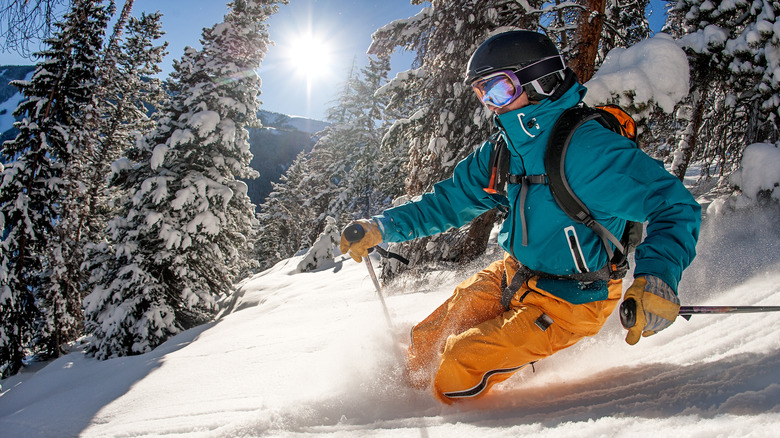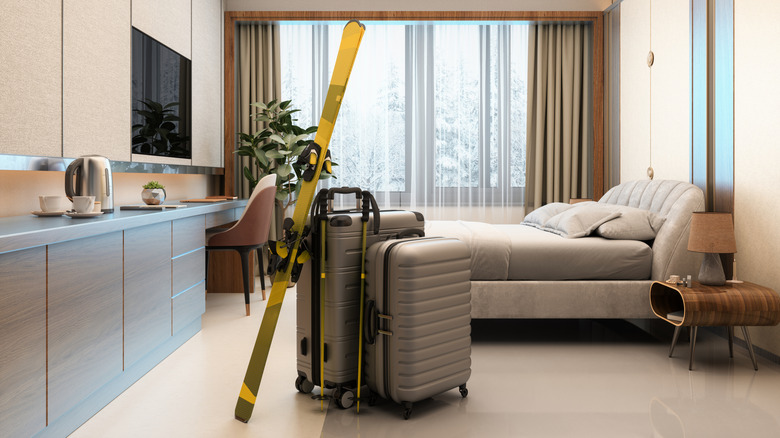One Expensive Scam Creates Nightmares For Travelers Every Winter. Here's How To Avoid It
If there's one thing that can derail an entire vacation (aside from forgetting to pack enough underwear), it's falling victim to a common scam. Based on a 2024 survey conducted by the cybersecurity firm McAfee, more than 25% (or one in four) of Americans have been affected by travel scams. According to McAfee's website, "These [scams] take several forms, and generally, they involve some mix of phony booking sites, bogus rental listings, and travel experiences that never materialize. Other tricks like phishing emails and messages round out the mix." Unfortunately for those who think they are smarter than the average scammer, Booking.com's internet safety boss, Marnie Wilking, reported in June of 2024 (via the BBC) that there has been "anywhere from a 500 to a 900% increase [in travel scams] in the past 18 months," due in large part to an increase in technological advances like AI.
Although travel scams are sadly prevalent year-round, winter sees a large influx of creative fraudsters, especially when it comes to travelers booking ski trips. Most savvy travelers are guilty of scouring every crevice of the internet for a good deal, especially during peak seasons. Lift tickets, rental equipment, car rentals, lodging — it can all come with a hefty price tag. Unfortunately for those who like to hunt for the best deals while booking a winter vacation, there are some things you should keep in mind to ensure financial safety. Namely, fraudulent rental ski gear.
How to avoid rental ski gear scams
Unfortunately, scammers are tricky, thus why so many get away with it each year. A common scam people deal with while booking a trip, particularly a skiing vacation, is not receiving the gear they've paid for. In an interview with HuffPost, Monica Patel told the tragic story of renting ski equipment through a site that claimed to have much cheaper prices than what her friends paid. When she tried picking up the equipment, she was unable to reach the company and lost out on the money she'd spent, forcing her to purchase much pricier items at the last minute. So how can you ensure you don't fall victim to one of these traps? Dean Van Es, founder and CEO of Fast Cover Travel Insurance suggests that to avoid situations such as this, "you should always book through reputable sources, like the resort's official website and known accommodation providers."
To save yourself from a major headache, it's important to be aware of red flags on any website where you buy or rent winter sport equipment, such as improperly spelled names, unrealistically cheaper rates, an unofficial website or address, and unregistered phone numbers. Using a credit card to book anything travel-related is always a smart idea, as most credit card companies will allow for a dispute of charges. As if getting scammed out of ski equipment wasn't bad enough, there are unfortunately a few more winter scams travelers should be wary of.
Other winter scams to be aware of
According to an interview with EuroNews, Sébastien Mérignargues, director of the French ski resort Avoriaz 1800 claims that one of the most common scams he sees is with rental accommodations. According to the 2024 McAfee survey, 13% of individuals said they paid a deposit on accommodations "that turned out not to exist or that had no record of their registration." Scam artists sometimes use Google ads to distract people from booking through sites like Airbnb or VRBO, showing an ad for something cheaper but just as nice. If you notice something fishy about an accommodation website or listing, try a reverse image search on Google using the images from the site to see what pops up. Sometimes scammers use stock photos or steal photos from other rental websites. Check the site for reviews, and make sure to only communicate and pay through a reputable platform.
The same can be said about car rentals, which can be scams any time of year. This can be especially true for icier locations, where accidents are more prone to occur. According to Dean Van Es in the HuffPost article, a common scam is when "rental companies bill for damage to their cars and provide fake photos as 'evidence' of a crash." To avoid being charged for something you did not do, make sure to take photos of every angle of the car before you drive it off the lot — and do the same when you return it so that you can dispute any false claims made against you. Vacations are a time to get away and relax, but unfortunately, they are also the time when scammers thrive. Take these savvy tips into consideration for your next winter getaway to ensure your (and your money's) safety.


